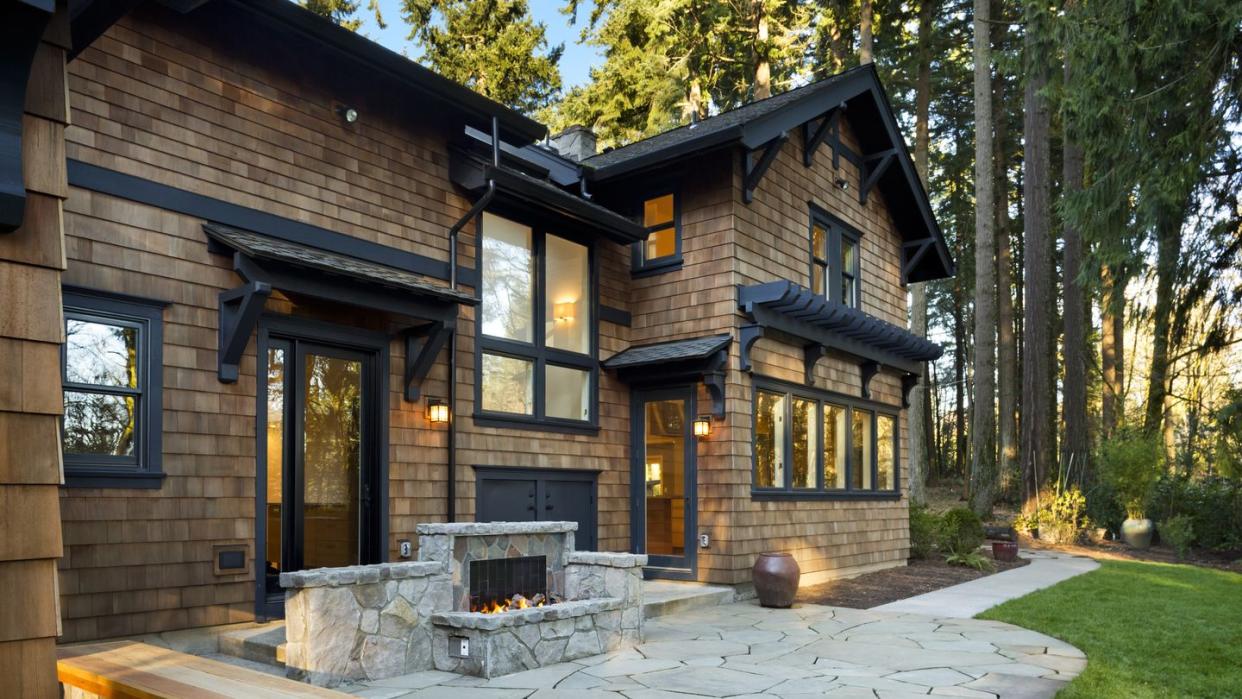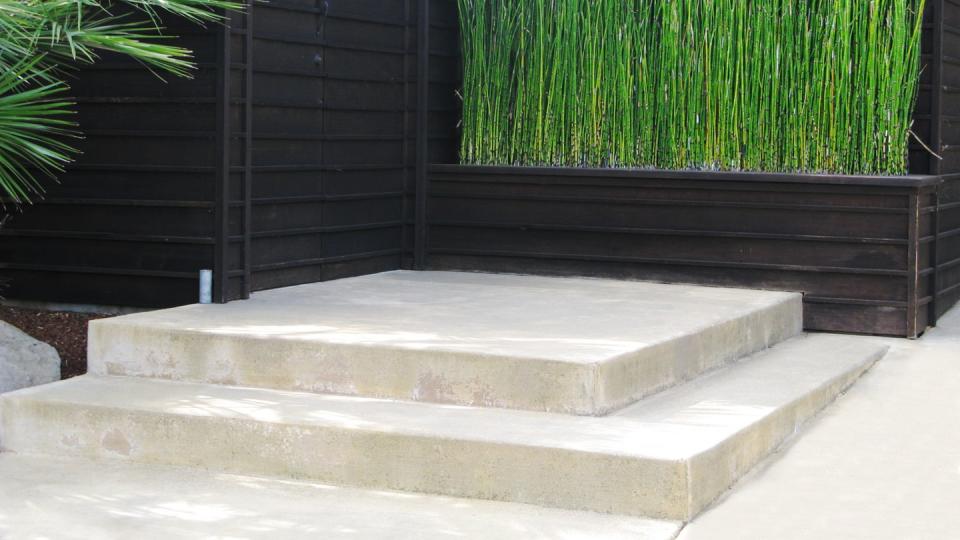This Is How Much a Yard of Concrete Will Cost You

"Hearst Magazines and Yahoo may earn commission or revenue on some items through these links."
[table-of-contents] stripped
When you're considering taking on a home improvement project you've never done before, the first question you're probably asking yourself is, How much is this supposed to cost? Compared with other renovation or construction projects, though, concrete is a relatively inexpensive material to buy, even though the installation process may seem like a huge ordeal.
Concrete is the go-to material for finishing a basement, building a patio, or putting a slab under a backyard shed or tiny home. It has also become a popular choice for other home improvement projects because of its durability and comparatively low cost, including interior floors and kitchen countertops. Thanks to advancements in staining and stamping, your concrete doesn't even have to look like concrete—it can be stained brown and stamped to look like wood.

How Much Does a Yard of Concrete Cost?
According to Angi and the landscaping website Lawn Love, the average cost of a yard of concrete is between $110 and $150 per cubic yard. For most sizable projects, you need to order concrete by the cubic yard. However, for some smaller projects, you may be able to order concrete by the cubic foot.
For larger jobs, you order concrete by the truckload rather than by the cubic yard. A truckload equals about 10 cubic yards, though that amount may vary from one company to the next. The average truckload of concrete costs from $1,100 to $1,440.
How to Calculate How Many Cubic Yards You Need
You can calculate the exact cubic yardage you need by multiplying the square footage of the area you want to cover by how deep you want the concrete to be, then converting that figure to cubic yards.
The average 10-by-10-foot concrete slab is 6 inches deep. To calculate how many cubic yards of concrete you'd need to pour it, you'd multiply 100 square feet by 0.5 feet, for a total of 50 cubic feet. Divide that number by 27 (the total number of cubic feet in a cubic yard) and you get 1.85 cubic yards.
With any project, it's a good idea to assume you’ll need a little extra, so we recommend rounding up by about 10 percent.
Price Per Concrete Strength
Just like any other material, concrete comes in different types with different strengths. Concrete strength is measured in pounds per square inch, or psi. Concrete psi ranges from 2,500 to 5,000. The higher the psi, the more expensive and stronger the concrete. Load-bearing structures, such as basements, driveways, and support piers, typically require a higher psi-rated concrete mix than non-load-bearing structures such as sidewalks, walkways, and patios.
3,000 psi concrete: $100 to $115 per cubic yard
3,500 psi concrete: $110 to $123 per cubic yard
4,000 psi concrete: $118 to $130 per cubic yard
4,500 psi concrete: $128 to $138 per cubic yard
5,000 psi concrete: $135 to $138 per cubic yard
Other Concrete Costs to Consider
For anything larger than one cubic yard, the best option is to purchase ready-mixed concrete from a concrete supplier. The average cost can be affected by a number of factors.
Labor
On average, you'll pay someone about $8 to $18 per square foot to install concrete for your project. This includes pouring, smoothing, and setting the material before it hardens and dries.
Does It Fill a Truck?
Most cement trucks can hold 10 cubic yards of concrete, and while you may think the truck can drive from site to site delivering the right amount of concrete to each customer, each batch is actually individually mixed and delivered. So if your order is less than a full truck load, you might pay a "short load" fee—typically $10 to $20 per cubic yard under a full truck load.
Price of Gas
Second, the cost of concrete in your area can be affected by the price of gas at the time of your project as well as the day of the week you want concrete delivered. (Saturdays tend to more expensive.) You'll be paying for the fuel it takes to get your concrete delivered.
Distance From Supplier
Concrete can sit in a cement truck for just 90 minutes or 300 rotations (whichever comes first) before it has to be poured. So the farther away you are from the concrete supplier, the more you'll have to pay.
Excavation and Grading
Labor costs and fees associated with preparing the surface are added to the final cost of your concrete pouring project. Before any concrete can be poured, the area needs to be excavated. Leveling and clearing the area costs between $50 and $200 per cubic yard, or between $200 and $6,000 per acre for larger spaces. Getting an area graded usually costs about $60 per hour for a professional and a tractor.
Subbases
A layer of sand and gravel must be laid and tamped down underneath the poured concrete to minimize the likelihood of shifting. This costs from $10 to $20 per cubic yard.
Molds and Forms
Because concrete is poured in its liquid state, a mold or "form" must be made to ensure the concrete sets in the right place and shape. Edge forms for concrete sidewalks and driveways run from $2 to $3 per linear foot, and forms for retaining walls, building walls, and foundation walls range from $2.50 to $6 per square foot. It's common for a concrete company to add a 20 percent waste fee for bracing and a 5 percent to 10 percent waste fee for plywood.
Concrete Reinforcement
Reinforcement prevents the concrete from cracking and improves poor soil conditions. Wire mesh can be added to the mixture at a price of $0.15 to $0.30 per square foot to make the area more structurally sound.
When to DIY
Whether you can DIY a concrete project or need to call in a professional depends on the size of your project and how much concrete you need. Dry bags of concrete are readily available at hardware and home improvement stores, costing $5 or less for bags averaging 60 to 90 pounds each. They may be cheap, but these bags won't get you very far for anything other than pouring a small stoop or step or setting fence posts or a mailbox. For bigger projects, we recommend hiring a pro.
You Might Also Like

